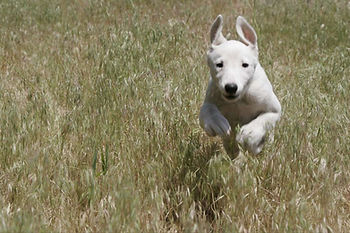Are you wondering how to calm down a hyper dog?
Pet ownership can be one of life’s greatest joys, but it comes with its fair share of challenges, especially when it comes to learning how to calm down a hyper dog. A hyper dog can often be misunderstood, labeled as ‘naughty’ or ‘difficult,’ when in fact, they might just need a little extra help and guidance in channeling their energy. This guide is here to help dog owners understand and manage their furry friends’ hyperactivity, leading to a more serene coexistence and a happier doggy life.
Understanding Hyperactivity in Dogs
Before addressing the issue of hyperactivity, it’s crucial to understand what it is and why it occurs. Hyperactivity in dogs is characterized by excessive energy, often leading to behaviors like jumping, mouthing, or destroying objects. Dogs are typically at their most hyper during their puppy years, and sometimes this high-energy nature can persist into adulthood.
Common Hyperactive Dog Breeds
Several breeds are particularly known for their boundless energy and enthusiasm. Breeds such as Border Collies, Australian Shepherds, Jack Russell Terriers, Labrador Retrievers, and Dalmatians often require more physical exercise and mental stimulation than others.
These breeds were originally bred for demanding jobs, including herding, hunting, and rescue operations, which contribute to their high energy levels. Understanding the innate tendencies of these breeds can help owners devise suitable activities and training strategies to manage their energy effectively and prevent hyperactive behaviors from becoming problematic.
Is My Dog Actually Hyperactive?
It’s important to note that what many might interpret as hyperactivity in their dogs could actually be a symptom of their environment or even separation anxiety. Dogs are highly social creatures and can show signs of distress when left alone for extended periods or if their living environment lacks sufficient stimulation.
These manifestations might include destructiveness, incessant barking, or restlessness, closely mimicking hyperactive behavior. Therefore, it’s essential for pet owners to assess their dog’s daily routine and environment to ensure it meets their pet’s needs for companionship, play, and mental engagement.
Signs of Hyperactivity in Dogs
Signs of a high energy dog can vary, but common ones include:
-
Incessant pacing or running
-
Uncontrollable jumping
-
Excessive barking or whining
-
Difficulty settling down
If your dog displays several of these behaviors on a regular basis, it’s time to address the issue.
Common Triggers of Hyper Dogs
Understanding the potential triggers can help in managing the hyperactivity. Common causes include:
-
Lack of exercise
-
Excess energy due to youth or breed characteristics
-
Boredom or insufficient mental stimulation
-
An unhealthy diet
-
Anxiety or fear
To effectively mitigate your dog’s hyperactivity, it’s crucial to closely monitor and identify any underlying factors that might be influencing their behavior.
How to Calm Down a Hyper Dog with Exercise
Regular exercise is paramount when it comes to calming down a hyperactive dog. Just like with humans, daily physical activity is crucial for a dog’s well-being. Breeds such as the Border Collie or Labrador Retriever have been bred to be working dogs – they require more than just a stroll around the block to satisfy their needs.
To help manage your pet’s high energy:
-
Make sure they get at least 30 minutes to 2 hours of exercise every day, depending on their age, breed, and health.
-
Engage in activities that they love, whether it’s a long jog, a game of fetch, or a trip to the dog park.
-
Consider enrolling your dog in agility classes or other canine sports to challenge them physically and mentally.
Exercising with your dog can also be a great bonding activity that benefits both of you.
How to Calm Down a Hyper Dog with Mental Stimulation
Physical and mental stimulation work together to create a healthy and calm dog. Mental stimulation can be achieved through:
-
Interactive toys, such as puzzle feeders, that require problem-solving
-
Training sessions that teach them new tricks or reinforce obedience
-
Daily walks or jogs in different environments to expose them to new sights and smells
Remember, a tired mind is as good as a tired body for a contented dog.
How to Calm Down a Hyper Dog | Create a Calming Environment
Consistency and routine often provide a sense of safety and calm for dogs. Here’s how to create a harmonious setting for your pet:
Establishing a Routine
Dogs are creatures of habit, which means they find comfort and security in a predictable routine. Feeding, walking, and playtime should occur at roughly the same time each day. A consistent routine fosters emotional stability in your pet and can help regulate their energy levels.
Providing a Safe Space
Create a retreat where your dog feels secure and can regroup when they become overwhelmed. This might be a cozy crate or a specific corner of the house where they have their bed with dog treats and toys. Encouraging your dog to spend time in this space can help manage their energy levels.
Check Your Dog’s Food Ingredients
Believe it or not, what your dog eats could be contributing to their hyperactivity. Certain dog food ingredients and allergens have been linked to increased energy levels and erratic behavior in dogs. When selecting dog food, consider:
-
Opting for high-quality, well-balanced diets with natural ingredients
-
Avoiding products that contain excessive levels of sugar, artificial colors, and preservatives
A healthy diet can make a huge difference in your dog’s behavior and energy levels. It’s advisable to have a detailed conversation with your veterinarian to determine the most beneficial diet plan for your hyper dog. Your vet can provide personalized recommendations that not only address dietary needs but also contribute to a calmer, more balanced demeanor in your pet.
Training Techniques
Training is a wonderful way to bond with your dog and to help them release their energy in a controlled manner.
Positive Reinforcement
Positive reinforcement training techniques, which involve rewarding your dog for good behavior, are highly effective in managing hyperactive tendencies. Pet parents should use praise, treats, and rewards to teach their dog what’s expected of them in a positive way.
Obedience Training
Consistent training in basic commands like ‘sit,’ ‘stay,’ and ‘heel’ can provide your dog with a sense of structure and purpose. This, in turn, can reduce their hyperactivity by giving them something constructive to focus on.
Relaxation Exercises
Introduce relaxation techniques such as ‘down-time’ or ‘chill’ commands. Teaching a dog when and where to relax can be instrumental in combating their hyperactivity.
Managing Stress and Anxiety
Sometimes, hyperactivity in dogs can be a result of stress or anxiety, especially if it’s rooted in separation anxiety.
Identifying Stressors
Being observant and trying to identify the situations or events that cause stress or over-excitement in your dog’s brain is crucial to managing their hyperactivity effectively. Common stressors include loud noises such as fireworks, significant changes in routine like moving to a new home, or unfamiliar environments such as a crowded park. Additionally, certain interactions, like meeting other dogs or people, can also serve as triggers.
Monitoring your dog’s reactions in various scenarios will help you pinpoint specific stressors. Once identified, you can then work on gradually desensitizing your dog to these triggers or finding ways to avoid or mitigate them, creating a more relaxed and comfortable environment for your pet.
Using Calming Aids
In managing a hyper dog, calming aids can be incredibly effective, especially during events that may cause stress or anxiety. Products like Adaptil diffusers or collars mimic the natural comforting pheromones that mother dogs emit to calm their puppies. These pheromones can have a similar soothing effect on dogs of all ages, reducing signs of stress and making them feel safer and more relaxed.
Thundershirts work on the principle of applying gentle, constant pressure – similar to swaddling an infant- to alleviate anxiety. This method is particularly useful during thunderstorms, fireworks, or other situations that might trigger a dog’s anxiety. The comforting pressure provides a calming effect for many dogs, decreasing their hyperactivity and helping them to focus.
For those preferring a more natural approach, remedies like chamomile or lavender can be beneficial. Chamomile is known for its calming properties and can be given to dogs in the form of iced tea or as a supplement. Lavender, on the other hand, can be used as an essential oil diffused in the air, offering a soothing scent that can calm anxiety when inhaled through your dog’s nose. However, it’s important to use these natural remedies under the guidance of a veterinarian, as certain forms or amounts may not be suitable for all dogs.
Using these calming aids, whether in isolation or combination, can significantly contribute to creating a more peaceful environment for a hyper dog. They serve as valuable tools for pet owners seeking to alleviate their dog’s stress, ensuring a happier, more harmonious home for everyone involved.
When to Seek Professional Training for Hyperactive Dogs
For severe cases of hyperactivity, consulting a professional dog trainer can provide tailored advice on managing your dog’s hyperactivity. Recognizing the unique challenges that come with managing a hyperactive dog, Snouts & Stouts in partnership with Ruff House Dog Training offers specialized professional training services tailored specifically for high-energy breeds and individuals. Our expert trainers in Arlington, Virginia are well-versed in modern, positive reinforcement techniques that not only engage your dog mentally but also help in channeling their energy into positive behaviors.
Now You Know How to Calm Down a Hyper Dog
Implementing these strategies can make a significant difference in managing your hyper dog’s behavior. By addressing the root causes, providing ample mental and physical stimulation, creating a calm environment, and using thoughtful training methods, you are setting the stage for a harmonious life with your pet. Remember, calm and happy dogs lead to a more tranquil and joyous household for everyone.


















